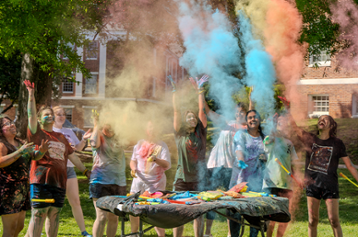Advisor: Dr. Glenda Ferguson
gferguson@wesleyancollege.edu
Pharmacists dispense medications prescribed by physicians and other health professionals. They must understand the use, clinical effects, and composition of drugs. Pharmacists work in a variety of settings, including retail drug stores, hospitals, and clinics
An excellent undergraduate GPA (3.5 and above), competitive PCAT scores, and considerable experience shadowing or working in a pharmacy is absolutely critical for acceptance into pharmacy programs. Pharmacy programs are four years from point of entry, resulting in the awarding of a doctor of pharmacy (Pharm. D.) degree. Students who achieve the Pharm.D. degree must also pass the North American Pharmacist Licensure Examination (NAPLEX) and state law examination in order to engage in professional practice.
The general requirements for pharmacy school include the following courses. Individual pharmacy schools have different requirements for coursework, so make sure to check with the pharmacy school of your choice. You do not have to major in biology, but you must have the requisite biology/chemistry courses in order to fulfill the requirements for admission. Likewise, required classes outside the areas of science and math vary between pharmacy programs; however, most of these (eg., economics and public speaking) can be met through Wesleyan's general education curriculum. Consult the pre-Pharmacy Advisor, Dr. Glenda Ferguson, for assistance with coursework and timeline.
Course and Semester Hours
| YEAR ONE Fall Semester | YEAR ONE Spring Semester |
|---|---|
| WISE 101 | BIO 112 |
| BIO 110 | MAT 220 |
| MAT 205 | Gen Ed Electives/Foreign Language |
| Gen Ed Electives/Foreign Language | - |
| YEAR TWO Fall Semester | YEAR TWO Spring Semester |
| CHM 101 | CHM 102 |
| Gen Ed Electives /ENG 111 | BIO 211 |
| Major Coursework | Gen Ed Electives |
| BIO 210 | Major Coursework |
| YEAR THREE Fall Semester | YEAR THREE Spring Semester |
| CHM 221 | CHM 222 |
| Major Coursework/Gen Ed Electives/PDE | BIO 245 |
| - | BIO 318 |
| - | Major Coursework/ Gen Ed Electives/PDE |
| YEAR FOUR Fall Semester | YEAR FOUR Spring Semester |
| Major Coursework | Major Coursework |
| Gen Ed Electives | Gen Ed Electives |
| PDE | - |
*This plan presumes a minimum SAT score of 600 MAT/CR, entering as a first year traditional student
Please note that as mentioned above, pharmacy schools differ in their criteria, and in the weight given to each of the following. Make sure that you are familiar with the criteria used by the school to which you are applying. The following is a general consensus of what most schools are using to evaluate applicants, listed in the order of importance:
The resources below are helpful for students preparing for a career in pharmacy. Wesleyan's Center for Career Development can help students with deciding if this path fits them, as well as with strategic career planning, creating resumes/CVs, writing personal statements, and more.
It’s important to gain work or volunteer experience in a pharmacy or health-related setting. The Center for Career Development can help you prepare a resume and practice your professional introduction as you get ready to contact organizations about shadowing, volunteer, or internship opportunities.

Wesleyan College is privileged to steward many arts and cultural events and share them with the community. Most are free and open to the public. Wesleyan art galleries are open M-F 1-5PM and on Wesleyan Market Saturdays from 10AM-2PM.
Event listing
Wesleyan College is home to five NCAA Division III sports: soccer, basketball, volleyball, tennis, and softball. In addition, we offer an award-winning Intercollegiate Horse Show Association (IHSA) Equestrian program.
View More
Tour our beautiful 200-acre campus featuring Georgian architecture, lush green spaces, recreational facilities, residence halls, and worship center.
Vist Wesleyan Virtually